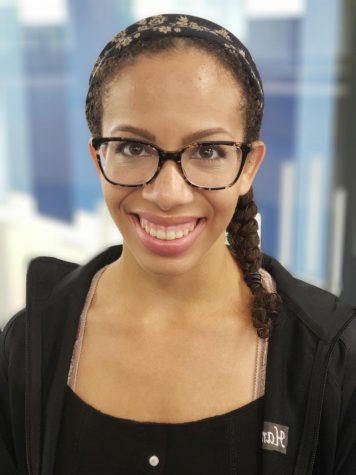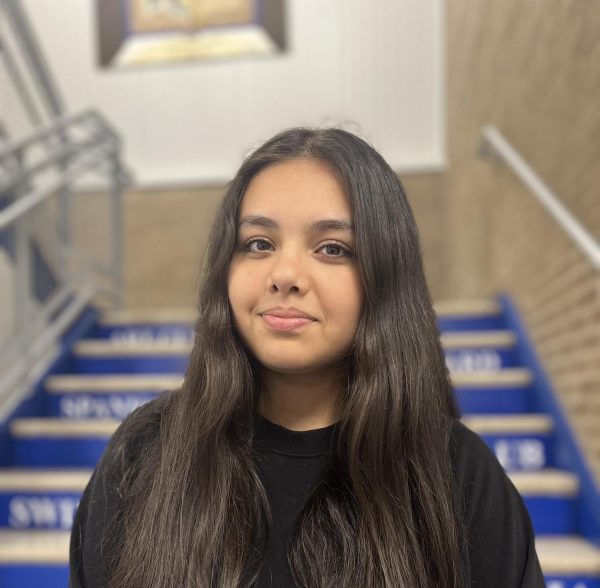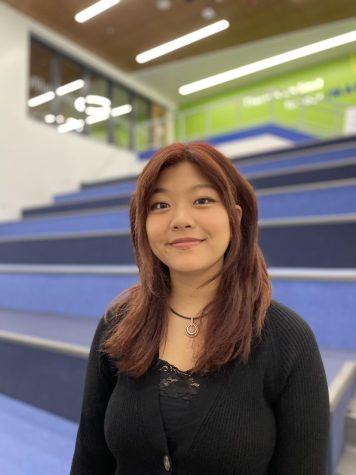The binary lens
Blinded by heteronormativity
Photo by Hannah Etienne
How heteronormativity as the default perception affects LGBTQ+ students.
Illinois became the first state to decriminalize homosexuality in 1961, although same-sex marriage remained illegal. Eight years later, the Stonewall riots in New York galvanized the gay rights movement, and on Stonewall’s one-year anniversary, June 28, 1970, thousands of people marched down the streets of Manhattan in America’s first gay pride parade.
Despite these advancements, until 1973, the American Psychiatric Association listed homosexuality as a mental disorder. Although homosexuality is no longer considered medically abnormal, the concept of heteronormativity describes a society that considers it socially abnormal. With nationwide legalization of same-sex marriage only six years behind us, there is still more that could contribute to the decades of progress in eradicating homophobia by creating a less heteronormative society.
Heteronormativity at School:
Heteronormativity is a systemic worldview, meaning it can be perpetuated by individuals and institutions, like schools.
“I think the gay community is always oversexualized by straight people,” Dana Fleming, Spectrum club leader, said. “When people [are against it in schools], it really makes no sense because there’s straight sex ed so why not gay sex ed? […] I think the main reason why people are so adamant about it not happening is because they still see being gay as something inherently sexual and something they don’t want their kids to be.”
A lack of inclusivity may be especially apparent in health class, but other students notice it in history and English classes as well.
“You don’t learn a lot about LGBTQ people, especially in history classes and […] English classes. All the essays you read are like white men that are straight. You never hear any diversity in that, which also creates an idea that that’s how it’s supposed to be,” Cristina MacCormac, junior, said.
Fleming suggests including more diversity into the English curriculum, so that students can see themselves represented in the literary texts.
“Maybe some of the books we read in English class could have an LGBT character or, for once, a character that isn’t some white guy,” Fleming said.
The curriculum isn’t the only area in which heteronormativity can be perpetuated, as it can make its way into daily classroom vernacular as well, according to Margeret Koy, Spectrum sponsor. Koy says phrases such as “ladies and gentlemen,” or separating students into boys and girls, can exclude nonbinary or gender nonconforming students.
“It’s that kind of thing that teachers have to really stop and think about what they’re doing when they do it,” Koy said.
Even in elementary school, casual comments from peers can reveal assumptions of heterosexuality.
“I remember in elementary school when girls would talk about what boys they liked, I just didn’t really get it,” Fleming said. “I remember in my head just picking a random one to tell them.”
Ellie Anderson, Spectrum club leader, has heard of similar experiences with LGBTQ+ friends having to “make up boys on the spot that they had a crush on.”
Most people start with a heteronormative mindset because it is prevalent in modern society, Koy says, and this mindset is mainly harmful when people refuse to grow beyond it and accept people for who they are.
“I know that some of the kids in GSA have been bullied for [identifying as a member of the LGBTQ+ community]. They don’t tell us, but you overhear them talking to each other,” Koy said. “And it never happens in front of a teacher. Almost never. But I know that it’s a thing that’s happened.”
Whether it’s insensitive comments or outright bullying, MacCormac says that heteronormativity is expressed more by students than the school itself.
“The teachers aren’t the problem. I feel like it more comes down to the atmosphere of the school and the students themselves, and teachers overlooking when students use terms like ‘gay’ as derogative,” MacCormac said.
Other LGBTQ+ students agree that they find the most support among the teachers and administrative staff. Jane*, senior, says she thinks “teachers do a great job here” and that she hasn’t had “a problem” with students either. But she acknowledges that students “[are] more disrespectful” to those who use neopronouns or recently came out as transgender.
MacCormac says that the Spectrum club, pride stickers on windows, and pride pins on teachers’ lanyards all help make LZHS feel like an inclusive environment. But there’s still more that LZHS could do to avoid perpetuating heteronormativity, says Olivia Virgilio, junior.
“I feel like normally only cis-het people are talked about in class and that could be changed,” Virgilio said. “In health, only hetero students are considered when talking about sexual health […]. Anything else is really just not brought up.”
Although schools have room for growth, political and cultural progress towards LGBTQ+ rights and acceptance creates an atmosphere of optimism for Katy Norberg, French teacher.
“I think that the world and society and people are changing a lot,” Norberg said. “As a society we are starting to become more understanding that it’s nice to be whoever you want to be, and you don’t have to fit in one little box anymore. You can click one box, you can click all the boxes if you want to, or none of the boxes. I hope that more change can happen or more progress starts to happen.”
Heteronormativity at Home:
People develop many of their values and views during their formative years at home. When heteronormativity takes root in the home, it can make LGBTQ+ students feel apprehensive about being themselves around their family.
“I was really nervous to tell my parents that I was lesbian even though I knew they weren’t gonna be super mad or kick me out or something,” Fleming said. “But it’s just the fact that I was nervous and another person would never be nervous to tell their parents they’re straight.”
Fleming says she knows many people whose “parents had to get used to the idea” when their child came out as a member of the LGBTQ+ community. While Fleming’s mom was not homophobic, she was “kind of hoping it was a phase” out of concern that Fleming would be made fun of in school.
Many LGBTQ+ students find that their parents aren’t as familiar with non-hetero relationships as straight ones, and can enforce heteronormativity without even being aware of it.
“When I was little my mom would be like, ‘oh, you’re gonna have a husband or a boyfriend,’ or my brother’s expected to date a woman and I’m like, ‘you can date whoever you want,’” John*, senior, said.
Assuming the heterosexuality of their children can lead to parents having to make bigger adjustments after their children come out. For Anderson, their parents started as indifferent towards the LGBTQ+ community, but leaned towards being more supportive after Anderson’s older sister came out.
“Then I came out, and they had to be supportive because we’re their kids,” Anderson said. “My mom had to learn a lot. Right now I use they/them pronouns and I just told my parents that this summer, so they have to still get used to [it]. They’ve been using she/her pronouns for me for 17 years and now they have to change.”
MacCormac says that heteronormativity “exists because of the way people grew up and their belief systems.” To avoid raising children that assume heterosexuality is the norm, Anderson suggests exposure to the LGBTQ+ at a younger age.
“It’d be good to introduce kids to [the LGBTQ+ community] earlier on, because the later it gets, the more opinions and prejudices they get, especially from parents,” Anderson said. “I’ve seen a lot more empathy if you explain to a kid what being gay is, they’re [usually] like, ‘okay, let me go play with my toys now,’ but if you explain it to a teenager that grew up with their parents being really homophobic, they’re going to have to get through all that hate to be able to get comfortable with the idea.”
Fleming says that as people unlearn heteronormativity, they will become more aware of and question heteronormative mindsets such as, “What’s so important about having a mom and a dad? Isn’t two parents of any gender enough?”
A lack of representation or education in the home can cause LGBTQ+ students to grow up feeling alienated or seeing themselves as different from other kids.
“If you’ve grown up being told—by society, by family, by your religion—that [being gay] is a bad thing and yet you suspect you are, that is going to be really hard,” Koy said.
In the home, heteronormativity can be difficult to avoid, especially because “that’s how society is raised, it’s just in movies, culture, media and all that stuff, it’s always just girl with boy, boy with girl,” Anderson says.
In spite of this, as media begins to explore more than cis-het relationships and students feel more comfortable exploring their identities, Koy says she’s noticed lots of progress, as Spectrum club wouldn’t have existed when she was in high school. She says, “I look at how people felt about [the] LGBTQ when I was a kid versus what it is now, [and] it’s very different.”
Unlearning Heteronormativity:
Advancements like the Inclusive Curriculum Bill, which mandates that Illinois public schools include the historical contributions of LGBT individuals in the curriculum, demonstrate what a less heteronormative society could look like. But growth on an individual level, including self-awareness of heteronormative biases, Koy says, are what helped her unlearn what she believes is a harmful mindset.
“It’s very degrading, to have who you are be denied. It’s very degrading to be treated as if who you are is wrong, or [as if] who you are does not fit in society. That’s extremely harmful […], and I think it’s even more difficult when [high schoolers] are at this age because you’re figuring yourself out,” Koy said.
Fleming says that heteronormativity is something that takes time and effort to overcome; however, this doesn’t mean progress and acceptance hasn’t been seen in LZHS. LGBTQ+ students like Jane say that LZHS does not perpetuate heteronormativity “because they do a lot of things to make it very inclusive to [LGBTQ+ students] about their sexuality.”
Koy says this is driven by the fact that, “[as] more and more people [are] coming out, people realize that [their] friend is gay, or [their] brother. Suddenly it’s somebody [they] know, and it’s not scary anymore because […] it’s somebody [they’re] comfortable with. I think more and more people being comfortable coming out has kind of driven it to be so different.”
Many members of the LGBTQ+ community feel accepted at LZHS, although Anderson points out that “it depends on who you surround yourself with,” and says that it’s important to have a support system of accepting friends.
“It would definitely be a lot easier on the LGBTQ+ community if we didn’t live in such a heteronormative society,” because if people didn’t assume heterosexuality, “coming out wouldn’t be such a big deal,” Anderson says.
As someone who says that the LGBTQ+ community can fall victim to bullying or harassment, Fleming suggests self-reflection as a way to unlearn heteronormativity.
“Ask yourself, ‘why do you make fun of a boy who talks a certain way and wears makeup, or a person that is an assigned male at birth if they are feminine-like?’ Just question the reason why you do things and ask yourself who it benefits,” Fleming said.
Anderson says they believe that people at LZHS can unlearn heteronormativity by keeping their minds open, being proactive by asking people for information on their preferred pronouns and preferred names, and staying aware of current events that are impacting the LGBTQ+ community.
More advancements towards unlearning heteronormativity are still necessary, Koy says, but “[we] have to be optimistic. If you’re not optimistic, what the heck is the point, right? If you think things can’t get better then what good is anything? So yeah, [we] have to be optimistic.”

Hannah’s third year on staff is her first year as Spotlight Editor. She spends more time talking to her cats than practicing her flute as a band member....

Coming back for her last year on Bear Facts, Gurneer will be Spotlight Editor for the second year in a row. Outside of Bear Facts, she participates in...

Going into their third year of being on the Bear Facts Staff, Kara hopes to take on Lois Lane-type capers as a senior. If you were to spot them outside...


Cole Belew • Oct 19, 2021 at 2:44 pm
Sick Pics